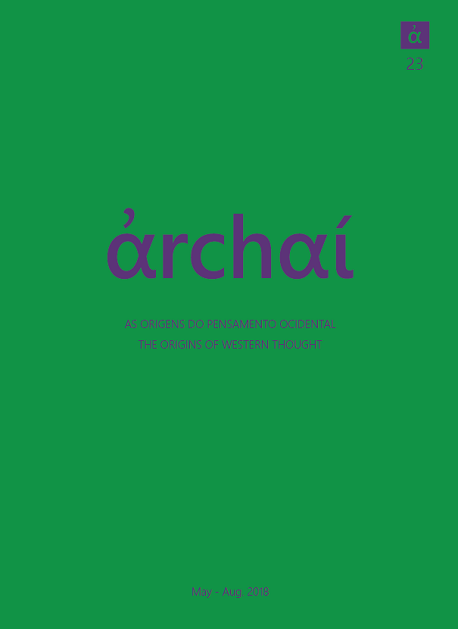Plotinus and Augustine on evil and matter
DOI:
https://doi.org/10.14195/1984-249X_23_7Keywords:
Augustine, Plotinus, matter, evil, non-beingAbstract
The aim of this paper is to examine whether and, if so, how far, the Augustinian notion of malum is related to Plotinus’ concept of evil, as it appears in Ennead I. 8 [51]. The Augustinian notion of evil will be analyzed by focusing on the De natura boni, considering plurality and unity in Augustine’s identification of malum and nihil, both in their ontological and axiological dimensions. Topics selected for special consideration will be, first, evil as lack of modus, species and ordo naturalis (De nat. b., 4), and, secondly, corruptio as cause of defectio boni (De nat. b., 6). The second part will analyze Plotinus’ notion of evil, as spelled out in Ennead I, 8 [51], considering the Plotinian identity of to kakon and me on. Topics selected for analysis will be, first, the concept of evil as lack of measure, form and order (Enn. I. 8. 3), and secondly, the notion of to kakon as lack of good (Enn. I. 8. 5) simpliciter. The third part of this paper will consider the differences between Augustine’s and Plotinus’ identity of evil and non-being, as related to the notion of matter. Topics selected for analysis will be, firstly, Plotinus’ identity of matter and evil (Enn. I. 8. 10), and, secondly, Augustine’s concept of matter as capacitas formarum (De nat. b., 18). The conclusion will bring out how Plotinus’ concept of steresis suggests both a different relation between evil and non-being while being closely resembling Augustine’s pattern of malum and nihil.
Downloads
References
BEIERWALTES, W. (1994). Agostino e il neoplatonismo cristiano. Milan, Vita e Pensiero.
BETTETINI, M. (1994). La misura delle cose: struttura e modelli dell’universo secondo Agostino d’Ippona. Milan, Rusconi.
BEZANÇON, J. N. (1965). Le mal et l’existence temporelle chez Plotin et Saint Augustin. Recherches Augustiniennes 3. p. 133-160.
CATAPANO, G. (2006). Introduzione Generale. In: Aurelio Agostino. Tutti i dialoghi. Milan. Bompiani, p. IX-CLXVI.
CHIARADONNA, R. (2009). Plotino. Urbino, Carocci editore.
CORRIGAN, K. (1996). Plotinus’ Theory of MatterEvil and the Question of Substance: Plato, Aristotle, and Alexandre of Aphrodisias. Leeuven, Peeters.
DE CAPITANI, F. (1980). «Corruptio» negli scritti antimanichei di S. Agostino. I. Rivista di Filosofia Neoscolastica 72. p. 640-669; (1981). II, 73. p. 132-156.
DI SILVA, M. F. (2015). Agostino e il problema del negativo. Pluralità e unità dell’identità di male e nulla. In: ALICI, L. (ed.). I conflitti religiosi nella scena pubblica. Roma. Città Nuova, p. 105-118.
MÜLLER, C. (1986). Corruptio-incorruptio. In: MAYER, C. (ed.). Augustinus-Lexikon. Basel. Schwabe, p. 47-53.
LA BONNARDIÈRE, A. M. (1970). Biblia Augustiniana. Paris (France), Études Augustiniennes.
MOON, A. A. (1955). The De Natura Boni of Saint Augustine (translation). Washington, Catholic University of America Press.
NARBONNE, J. M. (1994). La Métaphysique de Plotin. Paris (France), Vrin.
O’BRIEN, D. (1971). Plotinus on evil: a study of matter and the soul in Plotinus’ conception of human evil. In: SCHUHL, M.; HADOT, P. (eds.). Le Néoplatonisme: Royaumont, 9-13 juin 1969. Paris. Editions du Centre National de la Recherche Scientifique, p. 113-146.
O’BRIEN, D. (1996). Plotinus on matter and evil. In: GERSON, L. P. (ed.). The Cambridge Companion to Plotinus. Cambridge. The Cambridge University Press, p. 171-195.
O’MEARA, D. (1999). Introduction. In: Plotin. Traité 51 (I, 8). Paris. Éditions du Cerf, p. 11-41.
REALE, G. (2001). Introduzione. In: Aurelio Agostino. Natura del bene. Milan. Bompiani, p. 13-103.
RIST, J. (1961). Plotinus on matter and evil. Phronesis 6. p. 151-164.
RIST, J. (1974). Plotinus and Augustin on evil. In: AA. VV., Plotino e il Neoplatonismo in Oriente e in Occidente (Roma, 5-9 ottobre 1970). Rome, Accademia Nazionale dei Lincei.
ROCHE, W. J. (1941). Measure, Number, and Weight in St. Augustine. New Scholasticism 15. p. 350-376.
SCHÄFER, C. (2004). Matter in Plotinus’s Normative Ontology. Phronesis 143. p. 266-294.
Downloads
Published
How to Cite
Issue
Section
License
Given the public access policy of the journal, the use of the published texts is free, with the obligation of recognizing the original authorship and the first publication in this journal. The authors of the published contributions are entirely and exclusively responsible for their contents.
1. The authors authorize the publication of the article in this journal.
2. The authors guarantee that the contribution is original, and take full responsibility for its content in case of impugnation by third parties.
3. The authors guarantee that the contribution is not under evaluation in another journal.
4. The authors keep the copyright and convey to the journal the right of first publication, the work being licensed under a Creative Commons Attribution License-BY.
5. The authors are allowed and stimulated to publicize and distribute their work on-line after the publication in the journal.
6. The authors of the approved works authorize the journal to distribute their content, after publication, for reproduction in content indexes, virtual libraries and similars.
7. The editors reserve the right to make adjustments to the text and to adequate the article to the editorial rules of the journal.



